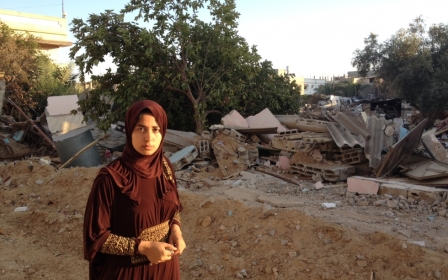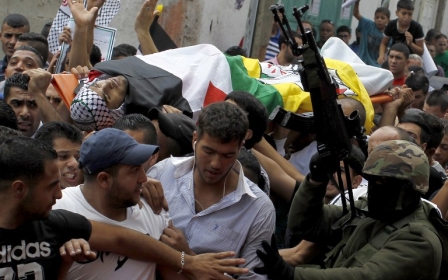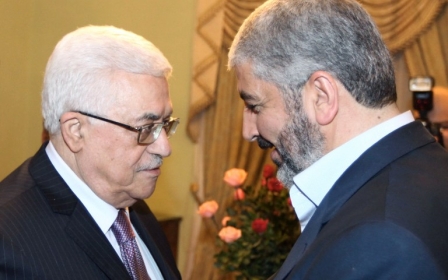Israeli troops kill West Bank man as fresh Gaza ceasefire holds

A 22-year-old Palestinian was killed in a standoff with Israeli forces near the West Bank town of Nablus on Monday as a new 72-hour ceasefire in Gaza agreed late Sunday held overnight.
Zakariya al-Aqraa was killled, and five others injured, after Israeli troops threw bombs and opened fire on a house in the village Qabalan where the 22-year-old had "holed up", according to a local medic.
Aqraa reportedly shot at an undercover police unit that had arrived at the house to arrest him, Haaretz reported. When he refused to surrender, officers fired a missile towards his home and gunfire was exchanged.
Israeli troops partially demolished the house with a bulldozer, Anadolu Agency reported.
At least 19 Palestinians have been killed in the West Bank since the start of the 34-day conflict in Gaza, with protests and stone throwing in several towns on Saturday after the funerals of two men killed on Friday in clashes with police.
The fresh 72-hour ceasefire between Israel and Hamas came into effect in Gaza one minute after midnight on Monday morning, paving the way for talks in Egypt aimed at a durable end to a month-long conflict that has wreaked devastating bloodshed.
The agreement clinched days of reportedly frantic mediation to stem a firestorm of violence that has killed 1,939 Palestinians and 67 on the Israeli side since 8 July.
Minutes before the truce began, Hamas's armed wing claimed it fired "several" rockets at Israel, including one at Tel Aviv. There were no immediate reports of any damage.
Egypt urged Israel and the Palestinians to use the new truce to "reach a comprehensive and permanent ceasefire", after an earlier three-day truce collapsed on Friday.
UN Secretary-General Ban Ki-moon also said he hoped it would give the two sides "another chance to agree on a durable ceasefire for the benefit of all civilian populations and as a starting point to address the underlying grievances on both sides", a statement from his spokesman said.
"The United Nations stands ready to assist in the implementation of an agreement that would consolidate peace and allow for much needed reconstruction and development of Gaza," the statement added.
The ceasefire must lead to the lifting by Israel of its blockade of the Gaza Strip, Hamas chief Khaled Meshaal told AFP in an exclusive interview in Doha on Sunday.
"We insist on this goal," he said. "In the case of Israeli procrastination or continued aggression, Hamas is ready with other Palestinian factions to resist on the ground and politically," he added.
Veteran Palestinian negotiator Saeb Erekat arrived in Cairo Sunday night for talks with Egyptian and Arab League officials on behalf of Palestinian president Mahmoud Abbas, an airport official said.
Following a recent top level meeting between Meshaal and Erekat, Hamas's deputy chairman and chief negotiator in Cairo, Moussa Abu Marzouk, was instructed to sign the Rome Statue, the document supporting the State of Palestine as a member of the International Criminal Court in The Hague, as reported in an MEE Exclusive on Sunday.
Hamas has decided to demand that Palestinian president Mahmoud Abbas sign the statute even though the movement may be subject to prosecution as a result, sources told MEE.
The document already contains the signatures of the PLO executive committee, Fatah Central Committee and other PLO organisations such as the Popular Front and the Democratic Front. But Abbas himself is resisting, as a result of the forceful opposition of the United States and the European Union.
A tape in which Erekat criticised Abbas’s refusal to join the ICC was leaked recently. Since the tape's release, Erekat has been at the forefront of a campaign to force Abbas’ hand. The PLO held a meeting recently in which all Palestinian factions put their name to joining the ICC.
Until now, Abbas has resisted pressure to sign the Rome Statute of 2002, the treaty that established the ICC, arguing that to do so would be to expose Palestinian militant groups to prosecution in the international court. The Hamas decision has obliterated this line of defence, informed sources told the MEE.
Israel has said its negotiation team would only return to Cairo once the truce went into force.
"If there is a full ceasefire on the ground the Israeli delegation will arrive in Egypt tomorrow," an Israeli government official said Sunday night.
Gaza reconstruction
Palestinian delegates in Cairo told reporters that they were happy for the Palestinian Authority, headed by president Abbas, to take over the reconstruction of Gaza and execute any agreement reached.
Israel refuses to deal with Hamas, branding it a terrorist organisation.
"The national unity government and the Palestinian Authority will take over the execution of all that will be agreed upon during the truce talks," Azzam al-Ahmed, head of the Palestinian delegation, told reporters.
"We are backing the setting up of a national body to be formed by president Abbas, which will take over the reconstruction (of Gaza)," said senior Hamas official Ezzat al-Rishq. "The president of the body should be professional, credible and one who will be accepted internationally."
Seven Gazans, including a woman and two 17-year-olds, were killed on the eve of the truce in a barrage of Israeli air strikes, and another 10 bodies were pulled from the rubble of previous strikes east of Gaza City, local medics said.
Hamas had refused to extend the 72-hour lull when it expired on Friday, and Israel accused the Islamist faction of breaching the agreement in its final hours with rocket attacks.
In the gap between ceasefires, Israeli warplanes hit more than 170 targets, killing at least 19 Gazans, while the Palestinians fired at least 136 rockets at Israel, of which 93 hit and 13 were shot down, with the rest falling short inside Gaza, the army said.
'God loves martyrs'
The UN says just under three quarters of those killed in Gaza were civilians. Around a third of the civilian victims were children.
In Deir al-Balah in central Gaza on Sunday, young men bellowed slogans as they carried the bloodied body of a 17-year-old, killed in an Israeli airstrike earlier in the day, to his grave. The Israeli army described the youth as a "prominent terror operative".
"God loves martyrs! We will march on Jerusalem in our millions," chanted mourners.
Israel said it closed its Kerem Shalom crossing used to truck supplies into the southern Gaza Strip after it was struck twice by rocket fire.
"Israel will not engage in negotiations under fire," Prime Minister Benjamin Netanyahu told his cabinet on Sunday, warning the operation would not stop until there was a prolonged quiet.
In the West Bank, an 11-year-old Palestinian boy was shot dead by Israeli troops as he played outside his home in Al-Fawwar refugee camp near the southern city of Hebron, relatives and medics said.
The army said troops had opened fire during a "violent riot", but it has opened an investigation into the circumstances of the shooting.
The resumption of fighting had put Netanyahu under increased pressure from hardliners to send ground troops back in to Gaza to topple Hamas.
New MEE newsletter: Jerusalem Dispatch
Sign up to get the latest insights and analysis on Israel-Palestine, alongside Turkey Unpacked and other MEE newsletters
Middle East Eye delivers independent and unrivalled coverage and analysis of the Middle East, North Africa and beyond. To learn more about republishing this content and the associated fees, please fill out this form. More about MEE can be found here.




